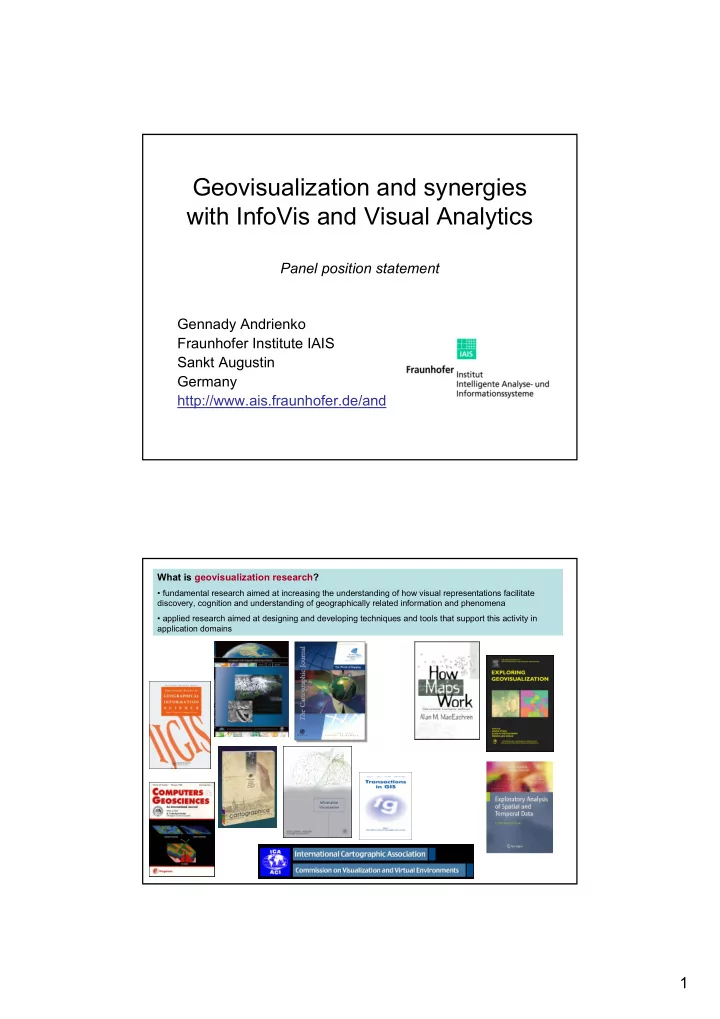

Geovisualization and synergies with InfoVis and Visual Analytics Panel position statement Gennady Andrienko Fraunhofer Institute IAIS Sankt Augustin Germany http://www.ais.fraunhofer.de/and What is geovisualization research? • fundamental research aimed at increasing the understanding of how visual representations facilitate discovery, cognition and understanding of geographically related information and phenomena • applied research aimed at designing and developing techniques and tools that support this activity in application domains 1
GeoVis plus GeoVis of • InfoVis, SciVis, statistical graphics, … • multimedia • dynamic phenomena and processes • movement and mobility • computational analysis • databases and data warehouses • complex spatio-temporal structures (plans,scenarios, effects and actions…) • modelling • imagery • spatio-temporal reasoning • terrain • non-geographic data GeoVis • Geographic representations • Geographic interfaces • Geographic interactions • GeoVisual Analytics • GeoCollaboration GeoVis for • exploration and analysis GeoVis users • knowledge building and integration • perception of space and maps • decision making • spatial cognition and reasoning • education and instruction • mental maps • presentation and communication • metaphors • collaboration • trends (wide use of online maps, navigation tools, geobrowsers, geo-wikis, …) Example: Analysing Movements 2
Example: Assessing a Schedule GeoVis @ Visualisation Summit � Workshop of 17 scientists working on GeoVis, InfoVis, and Visual Analytics � All answered 3 questions in advance: 1. What topics of GeoVis you are working on now? 2. What are, in your opinion, the major difficulties that prevent wide usage of geovisualizations? 3. In which areas of GeoVis you expect the major progress in next years? 3
Empirics Theory Methodology Practice Data: Design of generic • dynamic processes Data Data • movement – huge Typologies toolkits & infrastructures • complex structures – multivariate & Models (plans, scenarios,…) – uncertain • Scalability • Customisation • imagery Patterns & • Interoperability • terrain knowledge • Usability Tasks/Purposes: • typology Tasks/ • exploration & analysis • representation • Geographic interfaces • knowledge building Purposes • decision making Task • Geographic interactions • collaboration Typologies Design • Collaborative GeoVis • presentation & communication principles & Models • 3D & perspective views • education & instruction • Stereoscopic views Technology: Technology: GeoVis • Legend design – Web • requirements & • mobile devices operators Inventories • GeoVis + multimedia – GoogleEarth, • multimedia limitations GoogleMaps,… of • Visual Analytics • multimodal HCI • opportunities – SDI • augmented reality techniques • InfoVis interfaces – Wiki… Models of Users: • GeoVis of non-geo data Users: GeoVis • requirements • perception & cognition User/task-centred use • abilities • mental maps • preferences, design • metaphors habits • differences (professional, Experimental • Evaluation educational, cultural,…) studies General Specific Legend: InfoVis, Statistics Artificial Cartography Psychology – much work done abc and/or many people Data Mining Intelligence SciVis working – some work done; few … DB & DW abc people working Instructional sciences (?) Geocomputations HCI – nothing or very little abc done; none or very few people working Use of GeoVis Problems � Undeveloped terminology (e.g. how does GeoVis differ from cartography?) Widely used: � Low understanding of additional value of interactivity � Open online mapping tools � Focus on exploration limits users to experts � GoogleEarth, GoogleMaps, … Tools are designed for expert users → too complex! � � Weather forecasts � Poor design and low usability of tools; poor documentation � Navigation and routing tools � Tools do not exactly address users’ needs � GeoVis in geoscientific � Ignorance of potential users about the strength of GeoVis community � No success stories of solving real-world problems Lack of education and training in using GeoVis � � Low trust of domain specialists in visual approaches; bias towards numbers, formulas, and texts Not (widely) used: � Lack of support for documenting insights and knowledge gained → no material results! � Collaborative GeoVis � Lack of support for spatial and spatio-temporal reasoning � GeoVis of multivariate data � Lack of ready-to-use software � GeoVis of temporal data o Lack of advanced GeoVis functions in GIS � Visual data mining o Limited functionality of non-commercial tools (focus on particular � GeoVis of non-geographic data techniques and data types) � Generally, advanced GeoVis � Limited infrastructural (data model) basis tools produced by academics Lack of interoperability of data, systems, and tools/methods � � Lack of scalability w.r.t. data size, device characteristics, … � Gap between existing theory and technological opportunities 4
Challenges • Handle huge volumes of data • Handle complex and heterogeneous information • Handle dynamic phenomena and processes • Support time-critical analysis and decision making • Support externalisation of insights and synthesis of knowledge • Embrace new hardware and technologies • Increase the use of GeoVis tools, broaden the user community and application scope • Develop adequate theory and methodology InfoVis faces the same challenges ! Common opinion � We need research in multidisciplinary teams (including cartography & GeoVis, InfoVis, data mining, databases, HCI, cognitive sciences) � for solving real-life spatio-temporal problems (characterized by huge volumes of complex data) � in tight cooperation with domain experts 5
Where to learn more? � Special issue on “GeoVisual Analytics for Spatial Decision Support”, edited by G.Andrienko, N.Andrienko, P.Jankowski, and A.MacEachren Int.J.GIScience, 2007, v.21(8) http://kartoweb.itc.nl/icavis/index.html Next workshop: Helsinki, August 2-3, 2007 6
Recommend
More recommend